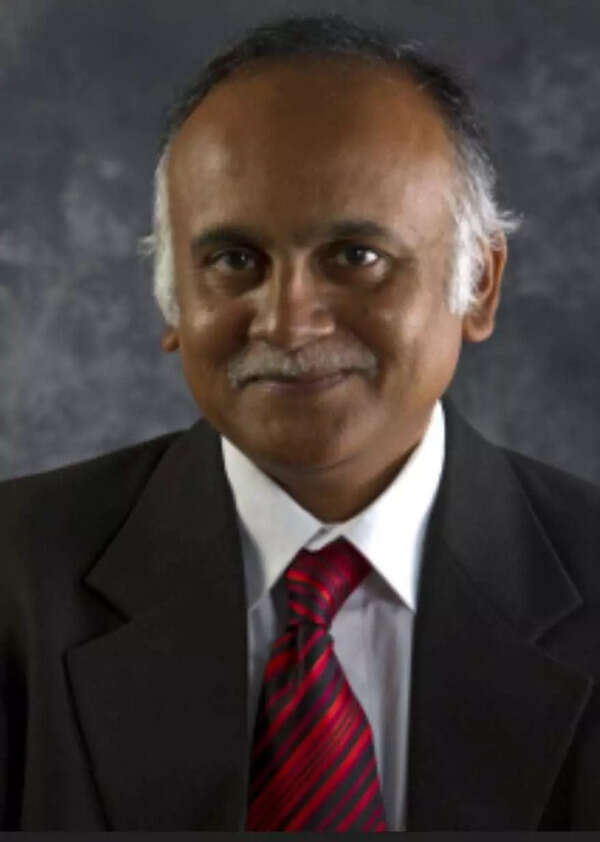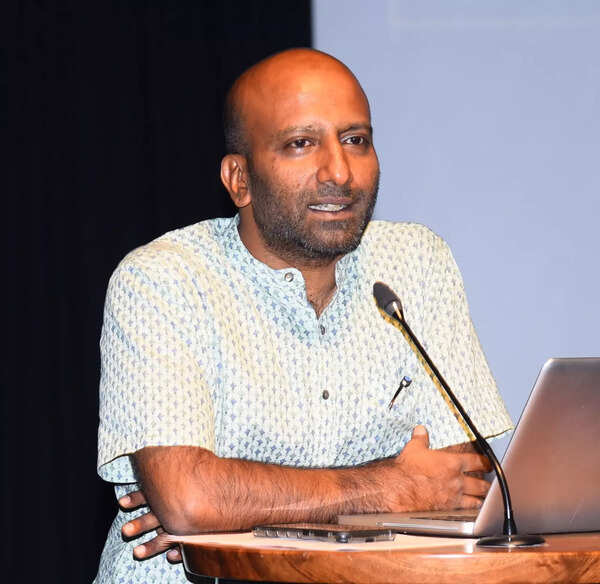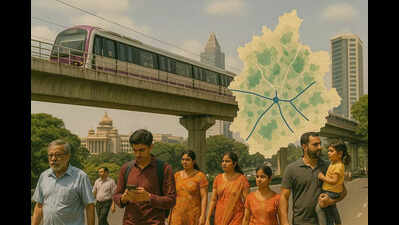Will it be a bold new B’luru? | Bengaluru News

Everyone’s happy BBMP is being done away with. But not everyone’s happy with the extent of devolution of powersMini.Thomas@timesofindia.comGreater Bengaluru Authority (GBA) is replacing BBMP. Many will celebrate this. BBMP’s reputation is so much in mud that most are likely to think any change is better than none. Surely, it can’t get worse than what it currently is.One key element of the restructuring – which is the one that has caught the most attention – is that Bengaluru will now be divided into 3 or more parts, and each will have its own municipal authority. Logically, that seems to be in the right direction. It’s easier to govern smaller units, which is why around the world, there is a devolution of powers to smaller units. And Bengaluru has grown so rapidly in the past two-three decades that it’s impossible to manage it with so much power centralised under a single authority. T R Raghunandan, former IAS officer and consultant on democratic decentralisation, notes that Switzerland has just about half the population of Bengaluru, but maintains 26 cantons (equivalent of states) and 5,500 communes (municipalities). He says dividing Bengaluru is a good idea, and establishes a basis for comparison and “indeed, constructive rivalry can be fostered through a healthy competitive spirit.”A major citizen body like Whitefield Rising also regards the development to be in the right direction, and noted that Mahadevapura had been asking for a separate municipality for several years now. BBMP, it said, has lost Bengaluru’s trust. “Accountability and performance issues abound. The current structure, even with the zonal divisions, is so broken that it cannot be fixed by any amount of amendments and fixes. We believe the only way forward is to completely disband this structure and start afresh,” it said in a post on X. It said that 3-5 smaller municipal corporations with each having 100-150 wards for localised decision-making will greatly improve services to the residents.But there are also plenty of civic activists who feel the Greater Bengaluru Governance Act (GBGA) has not done the level of local empowerment it should have, and that too much power is still wielded by state-level politicians through the GBA. “They are creating an apex layer controlled by the state government,” says Sandeep Anirudhan, convenor of Citizen’s Agenda for Bengaluru. The state govt, he says, should not be involved in city administration. GBA, he notes, has the power to introduce bylaws and meddle with ward committees. “GBA will be headed by the chief minister, while the deputy chief minister will serve as the vice chairman of the body of governance, and it will have heads of all parastatals.It is really sad that elected mayors and elected corporations have to be answerable to a bunch of politicians and bureaucrats,” he says.Raghunandan believes Bengaluru needs a coordinating authority. But he doubts whether GBA will meet those requirements.Kathyayani Chamaraj, executive trustee of Civic Bangalore, an NGO that works on urban governance and decentralisation, says citizens have been disempowered by making ward committees mere advisory bodies, with veto powers to the councillors to boot. “Area Sabhas which enable every voter to participate in the planning and decision-making for his/her area have been done away with totally,” she says. Whitefield Rising also has objected to the veto powers granted to councillors in ward committees.
Voice Box
SOME SAY IT’S A STEP IN THE RIGHT DIRECTION, OTHERS WANT COURTS TO INTERVENE TO MAKE IT MORE DEMOCRATIC
Breaking up Bengaluru into multiple municipalities appears to be a sensible approach. The quantity isn’t the crucial factor; rather, the fundamental concept deserves attention. Several well-administered major cities follow this model. For instance, Manila consists of 17 distinct cities. Brussels operates similarly. Switzerland presents an interesting comparison. Despite having only 8 million inhabitants, compared to Bangalore’s 15 million, Switzerland maintains 26 cantons and 5,500 communes.This demonstrates how intensive and localised governance can be effectively implemented.

TR Raghunandan
But the situation in Karnataka is different. We’ve too many planning authorities. For every alphabet, you have a planning authority and there is no coordination between them. So, GBA eventually will lead to a mess. There will be dilution of accountability. There will be overlapping of responsibilities and eventually Bengaluru will be governed badly. It is also ridiculous that the CM has downgraded himself to be the chairperson of the GBA.As for taking this matter to court, I doubt it will help because the Constitution does not prohibit a superstructure body.
T R Raghunandan, FORMER IAS OFFICER AND INTERNATIONAL CONSULTANT ON DEOCRATIC DECENTRALISATION
BBMP is a completely defunct municipality with opaque, corrupt systems. It promotes lawlessness, flouting all sections of the BBMP Act, 2020. There’s absolutely no accountability. There is no progress on any front at ward level despite a billion-dollar budget. And for us in Mahadevapura, reaching the BBMP head office for any decision is virtually impossible and there is no transparency. Although the GBGA has several infirmities which need improvement, we feel that this is a step forward by first disbanding BBMP and making three to five smaller corporations or whatever number they come up with, which will bring governance closer to the people. And each corporation will have audited accounts, its own financial statements, and most importantly get to keep their property taxes with the State mandated to balancing the budget for each of the corporations, with the recommendation of the State Finance Commission. Getting RWA ward committee members through a lottery system will give balanced representation. It’s only to be seen how all this will work out, but we feel something major like this needs to happen to get a fresh start, because the current system is simply not working. Delimitation should be done asap based on projected current population – not outdated 2011 census, and followed by the much-delayed elections.
A rethink on the entire Act is necessary through a challenge in the courts for the following reasons. The GBGA overturns the very concept of Urban Local Self-Governments (ULSGs), envisioned in the 74th Constitutional Amendment Act, as the state government is usurping the power of the local government by creating the state-level body, the Greater Bengaluru Authority (GBA), headed by the CM and several state-level ministers, MLAs, MPs, etc, to administer Bengaluru.

Kathyayani Chamaraj
The GBA, a body without constitutional status, has been given planning powers for Bengaluru, whereas the constitutionally mandated body for planning for Metros, the Metropolitan Planning Committee (MPC), has been relegated to the background to merely fulfil a constitutional requirement on paper.
Kathyayani Chamaraj, EXECUTIVE TRUSTEE, CIVIC BANGALORE, AN NGO THAT WORKS ON URBAN GOVERNANCE AND DECENTRALISATION
In an ideal situation, the higher the number of smaller governable entities, the more efficient the governance would be. But that happens only when there is a sound framework. The govt is avoiding the framework legislated by Parliament.

Sandeep Anirudhan
We are seeking legal recourse against the Act. Given that this involves constitutional aspects, a PIL in the Supreme Court appears to be the most suitable course of action.
Sandeep Anirudhan, CONVENOR-CITIZEN’S AGENDA FOR BENGALURU AND BENGALURU TOWN HALL
It seems urban governance is going to be driven by the real estate development lobby in the GBA regime. This will lead to chaos and mayhem in the city. The Greater Bengaluru Authority (GBA) will undermine the yet to be established Bengaluru Metropolitan Land Transport Authority’s (BMLTA) role and responsibilities. BMLTA’s main objective is to coordinate, plan and approve transport systems in Bengaluru’s metropolitan region.

Satya Arikutharam
The other main objective is to ensure seamless integration of various public transport modes, including buses, metro and suburban railways, to provide efficient services that encourage citizens to opt for public transport instead of private vehicles. Both these objectives will get diminished as it is unclear whether GBA-planned transport projects will seek BMLTA approval. Overall, instead of empowering local governance, the legislation introduces more bureaucratic and higher-tier govt interfaces.
Satya Arikutharam, URBAN MOBILITY EXPERT, BENGALURU
BBMP is going through a tectonic shift. It will take some time for GBA to take a complete shape of its own. So the present set-up will continue for some time, according to a circular we received on Friday.
Suralkar Vikas Kishore, SPECIAL COMMISSIONER, HEALTH AND ANIMAL HUSBANDRY, BBMP
















